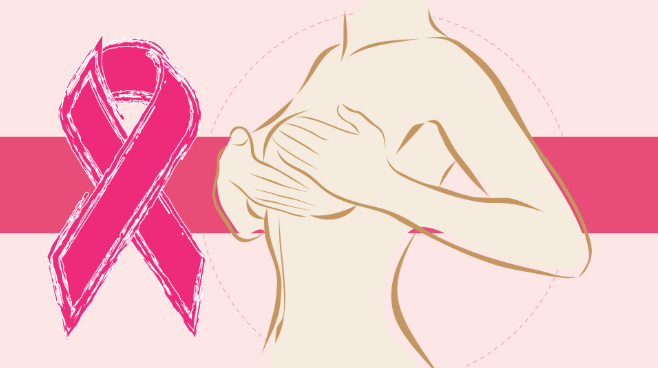Table of contents
Symptoms of breast cancer:
According to the Center for Disease Control and Prevention, possible symptoms of the disease include:
- A lump/swelling in the breast or armpit
- Thickening or swelling of the breast: orange-peel like the skin of the breast, i.e., swelling with dimples called peau d’orange appearance
- Dimpling/puckering of the skin overlying the breast or skin irritation
- Red or flaky skin in the nipple area, like the dry skin changes
- Nipple discharge other than breast milk
What can you do to avoid breast cancer?
Breast cancer prevention begins with your healthy habits like avoiding alcohol, being physically active, healthy diet, eating more fruits and vegetables, keeping weight in check, avoid smoking, knowing family history, etc.
Steps to lower the risk of breast cancer:
There are steps that you can take to reduce the risk of breast cancer. It is essential to follow these steps, especially if you have a family history of breast cancer.
Maintain your weight:
Obesity not only deteriorates one’s health generally but can also lead to a multitude of other diseases. Fat cells in a body are responsible for the production of hormones, which increase the influence on breast tissue and increase the proliferation of cells leading to cancer. Thus, decreasing fat from the body decreases this influence and the chances of getting cancer
So, a healthy weight is significant for everyone. Indulging in a good exercise regime can help a lot.
Avoid exposure to radiations:
Medical-imaging methods, such as computerized tomography, use high doses of radiation. Studies have shown that there are risks of breast cancer because of the radiation, so avoid radiation exposure. Reduce your exposure by having such tests only when necessary.
Be physically active:
Exercise is essential for your health. Being physically active can help maintain your weight.
Physically active women have a very lower risk of breast cancer. Exercise is one of the best ways through which you can manage your weight.
For most healthy adults, the Department of Health and Human Services recommends at least 150 minutes a week of moderate aerobic activity or 75 minutes of vigorous aerobic exercise weekly, plus strength training at least twice a week to prevent one from breast cancer.
What to take and what to avoid:
Women who eat a Mediterranean diet supplemented with extra-virgin olive oil and mixed nuts might reduce breast cancer risk. The Mediterranean diet focuses mostly on plant-based foods, such as fruits and vegetables, whole grains, legumes, and nuts. People who follow the Mediterranean diet choose healthy fats, like olive oil, over butter and fish instead of red meat.
A scientist has suggested avoiding some of the food to prevent breast cancer. People are advised and guided to cut down on alcohol, added sugar, fat, and red meat.
Prefer to eat a lot of fruits and vegetables:
A healthy diet can help a lot to lower the risk of breast cancer. You must try to eat fruits and vegetables as much as you can.
Avoid alcohol:
Drinking alcohol can cause many diseases. It is very unhealthy. Drinking too much alcohol can increase the risk of breast cancer. But if you drink alcohol at a moderate level, then it is not dangerous. For a healthy life, it is better to avoid drinking alcohol.
Alcohol can increase estrogen levels and cause damage to DNA cells. Studies have shown that women who drink three alcoholic beverages per week increase their risk of developing breast cancer by 15 percent. The risk goes up by around 10 percent with each additional drink per day.
Stop smoking:
Smoking is injurious to health. As smoking can cause many health problems, including heart disease, stroke, and cancer, breast cancer is one.
So, stay away from smoking and have a better life.
Sugar:
Sugar can also increase the risk of many diseases, including breast cancer. So, try to avoid sugar as much as possible.
Search out your family history:
If a woman has a strong family history of breast cancer, it is essential to protect her from breast cancer. So, it is highly essential to search out family history.
You may be at high risk of breast cancer if you have a mother or sister who developed breast or ovarian cancer (especially at an early age).
A doctor or genetic counselor can help you understand the family history of the disease.
Screening is important
Another important precautionary measure rather mandatory step is getting oneself screened. How often one should be screened depends on age.
Here’s the basic guide:
40 to 44
Women in this age group should get themselves screened once every year.
45 to 54
Women in this age bracket should also get themselves screened once every year.
Over 55
Women aged 55 or above are comparatively at a lower risk of getting breast cancer and, therefore, can get mammograms once every two years.
Generally, it is advised that if you experience anything unusual, do not take it for granted and get yourself screened immediately.
Other precautionary methods
All women should learn about self-examination. Self-palpation of the breasts can help them visit the doctor if they find any lump or any abnormality. This, in turn, can aid in early diagnosis and treatment.
Be Alert!
Be alert about breast cancer detection. If you notice any changes in your breasts, such as a new lump or skin changes, consult your doctor. Also, ask your doctor when to begin mammograms and other screenings based on your personal history.
